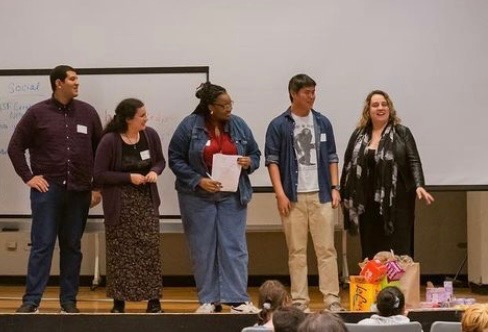Advocating for equality: Student club president strengthens community through creative writing

At the most recent creative writer’s club workshop, the space where the group normally meets was overflowing. It seems unusual that a new club could find such rapid growth, but for junior and club president Ariana Matondo, a group like this has been a long time coming.
“Having more people come in, that’s when it really hit us that ‘Oh, we’re gonna have to get another room because we have so many people interested in the club,’” she said. “That was just confirmation for me that a lot of other people have been waiting for this moment for a while.”
Matondo considered stories to be her lifelong love. She began learning about the art of storytelling while attending Blake High School, a Tampa school for performing arts. She arrived at USF last year as a transfer student, but was surprised to hear from her advisor that there were no creative writing clubs on campus. She quickly turned her shock into drive with the assistance of the Department of Humanities Director Liz Kicak, who helped her cultivate a space for students to share and perfect their writing.
“I knew right then and there that I wanted to start my own thing,” she said. “I met Dr. Kicak at the reading for the Humanities Institute and told her I was trying to find creative writing events on campus. She told me I could use her conference room to host writing workshops, so I started advertising it in all of my classes. Our first workshop had 13 people, the next had 20, and we just kept building from there.”
When the workshops began to grow, Matondo started collaborating with other groups on campus such as Thread literary magazine and the Humanities Institute. As word began to spread about the group, director of the creative writing department Heather Sellers approached her over winter break with a proposition to revive USF’s official creative writer’s club.
While never officially disbanding, the creative writers club silently came to a pause for a multitude of reasons. This was due to virtual meetings as a result of the pandemic as well as a change in leadership that caused the club to enter a hiatus with no set plans for it to return, according to Sellers. However, when she saw what Matondo was accomplishing in the community through her workshops, she wanted to see the group become an official club.
“Ariana has been absolutely one of our most outstanding undergraduates I’ve worked with in my decade at USF,” Sellers said. “She has completely reinvigorated our undergraduate creative writing community. She’s a dream to work with, I think of her as a colleague.”
Matondo worked alongside the club’s vice president, Ariadne Herrera, whom she met last semester at a writing event. Herrera immediately agreed with Matondo’s desire to create a space for undergraduate writers, and the two began collaborating on creating workshops. They said that Matondo’s ambition and her ability to communicate has been essential to bringing a space like the creative writer’s club back to the Tampa campus.
“There’s a lot of value in bettering ourselves as writers by connecting with our peers,” they said. “The department has been motivating with uplifting diverse perspectives and identities, the professors have all been very motivating and inspiring professional value and a career in professional writing.”
“Ariana is very motivated, and a great communicator as well. She’s been very fluid in how we collaborate and work on things within the club.”
In just under a year, Matondo has turned a dream into a flourishing reality. The creative writer’s club, now officially recognized by Student Government, has big plans for the fall semester.
From learning how to submit work to giving students the chance to perform their pieces on stage, the club is expanding its outreach to beyond the English department, but to all USF students. But no matter the turnout, Matondo is just happy that others are seeking out community like she did.
“I’ve always wanted to have a community of writers,” she said. “The whole heart behind the club is to foster community and let people even outside the creative writing major know that they have a place to share their work.”
“That’s what makes me happy, is seeing people taking that idea of community seriously and continuing to come back.”








